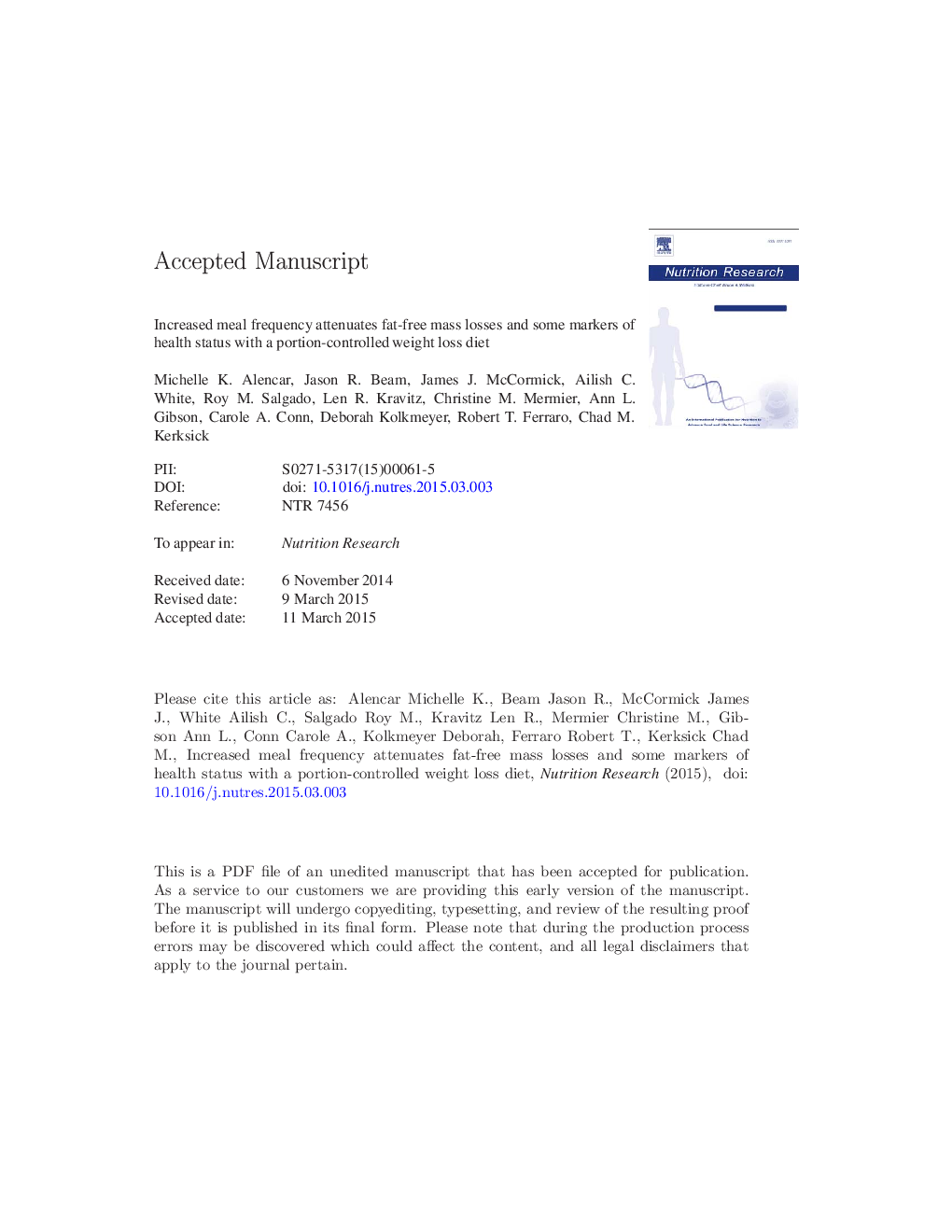| کد مقاله | کد نشریه | سال انتشار | مقاله انگلیسی | نسخه تمام متن |
|---|---|---|---|---|
| 5904393 | 1157990 | 2015 | 29 صفحه PDF | دانلود رایگان |
عنوان انگلیسی مقاله ISI
Increased meal frequency attenuates fat-free mass losses and some markers of health status with a portion-controlled weight loss diet
ترجمه فارسی عنوان
افزایش فرایند غذا موجب کاهش وزن بدون عاری از چربی و بعضی از نشانگرهای وضعیت سلامتی با رژیم غذایی کاهش وزن می شود
دانلود مقاله + سفارش ترجمه
دانلود مقاله ISI انگلیسی
رایگان برای ایرانیان
کلمات کلیدی
BIARMRHDL-CLDL-CFFMAUC - AUCResting metabolic rate - استراحت سرعت متابولیسمstandard deviation - انحراف معیارinsulin - انسولینcardiovascular disease - بیماری قلب و عروقیbioelectrical impedance analysis - تجزیه و تحلیل امپدانس بیوالکتریکanalysis of variance - تحلیل واریانسANOVA - تحلیل واریانس Analysis of variancetriglyceride - تریگلیسریدfat-free mass - توده بدون چربیLean body mass - توده بدون چربی بدنfat mass - توده چربیPercentage body fat - درصد چربی بدنCVD - رسوب دهی شیمیایی بخار body mass index - شاخص توده بدنBMI - شاخص توده بدنیEating frequency - فرکانس خوردنMeal frequency - فرکانس غذاhigh-density lipoprotein cholesterol - لیپوپروتئین پرچگالی یا اچدیالObesity - مرض چاقیarea under the curve - منطقه تحت منحنیWashout - واشنگتنbody weight - وزن بدن%BF - ٪ BFLow-density lipoprotein cholesterol - کلسترول لیپوپروتئین با چگالی کمGlucose - گلوکز
موضوعات مرتبط
علوم زیستی و بیوفناوری
بیوشیمی، ژنتیک و زیست شناسی مولکولی
علوم غدد
چکیده انگلیسی
Increased meal frequency (MF) may be associated with improvements in blood markers of health and body composition during weight loss; however, this claim has not been validated. The purpose of the study was to determine if either a 2-meal (2MF) or 6-meal frequency (6MF) regimen can improve body composition and blood-based markers of health while consuming a portion-controlled equihypocaloric diet. Eleven (N = 11) obese women (52 ± 7 years, 101.7 ± 22.6 kg, 39.1 ± 7.6 kg/m2) were randomized into treatment condition (2MF or 6MF) for 2 weeks, completed a 2-week washout, and alternated treatment conditions. In pre/post fashion, changes in body composition, glucose, insulin, and lipid components were measured in response to a test meal. Body mass was successfully lost (P â¤Â .05) under both feeding regimens (2MF: â2.8 ± 1.5 vs 6MF: â1.9 ± 1.5 kg). Altering MF did not impact glucose, insulin, total cholesterol, or low-density lipoprotein cholesterol (P > .05). On average, fat-free mass (FFM) decreased by â3.3% ± 2.6% following the 2MF condition and, on average, increased by 1.2% ± 1.7% following the 6MF condition (P â¤Â .05). Fasting high-density lipoprotein cholesterol (HDL-C) percentage increased during the 2MF condition; this was significantly greater than that in the 6MF condition (1.3% ± 12.2% vs 0.12% ± 10.3%) (P â¤Â .05). Overall, reductions in MF (2MF) were associated with improved HDL-C levels; but the clinical significance is not clear. Alternatively, increased MF (6MF) did appear to favorably preserve FFM during weight loss. In conclusion, caloric restriction was effective in reducing body mass and attenuating FFM changes in body composition; however, glucose, insulin, and lipid metabolism had no significant differences between MF.
ناشر
Database: Elsevier - ScienceDirect (ساینس دایرکت)
Journal: Nutrition Research - Volume 35, Issue 5, May 2015, Pages 375-383
Journal: Nutrition Research - Volume 35, Issue 5, May 2015, Pages 375-383
نویسندگان
Michelle K. Alencar, Jason R. Beam, James J. McCormick, Ailish C. White, Roy M. Salgado, Len R. Kravitz, Christine M. Mermier, Ann L. Gibson, Carole A. Conn, Deborah Kolkmeyer, Robert T. Ferraro, Chad M. Kerksick,
